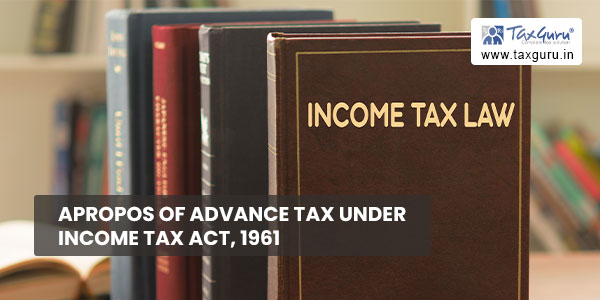What Is Advance Tax?
As we already know that the income-tax is payable on the income earned during the previous year and it is assessed or charges in the immediate succeeding assessment year (e.g.: I earned income in year 2021-22 will be assessed in next year i.e., 2022-23. In this case, my previous year would be the year 2021-22 and my assessment year would be 2022-23.).
Although income-tax is charged on the income of the previous year in the relevant assessment year, but according to section 207 of the income tax act,1961, Tax shall be payable in advance during any financial year, in respect of the total income of the assessee which would be chargeable to tax for the assessment year immediately following that financial year. In other words, we have to calculate our tax liability in advance on estimation basis in the previous year itself, though such income is chargeable to tax during the assessment year and paid such amount of estimated tax to the central government.
Basically, Advance Tax is a scheme of collection of tax like Tax Deduction at Source (TDS) by the central government. Such scheme of Advance Tax is also known as ‘Pay as you Earn’ scheme.
Page Contents
Who requires to pay advance tax?
As per section 208, every person whose estimated tax liability for the year is Rs. 10,000 or more, shall pay his tax in advance, in the form of “advance tax”.
However, as per section 207(2) a resident senior citizen (i.e., an individual of the age of 60 years or above at any time during the relevant financial year) not having any income from business or profession is not liable to pay advance tax.
E.g.: – Mr. Vinay (41 years) is running a Shop. The turnover of the Shop for the financial year 20X1-X2 amounted to Rs. 1,92,70,000. He wants to declare income under section 44AD at 8% of the turnover. He does not have any other source of income. Will he be liable to pay advance tax? What if the age of Mr. Vinay is 67 years?
Sol.: Mr. Vinay satisfies the criteria of section 44AD in respect of the business and, hence, he can adopt the provisions of section 44AD and declare income at 8% of the turnover.
A taxpayer opting for the presumptive taxation scheme of section 44AD is also liable to pay advance tax in respect of business covered under section 44AD. Thus, if Mr. Vinay adopts the provisions of section 44AD, he is also liable to pay advance tax in respect of income generated from provision store business.
Even if Mr. Vinay is a senior citizen (age of 65 years) then also, he is liable to pay advance tax as his income chargeable under the head of “Profits and gains of business or profession”.
When to pay Advance Tax?
Advance Tax is payable in four instalments during the previous year. As per section 211, Following are the due dates for payment of instalments of advance tax:
| Type of Assesee | By 15th June | By 15th Sept. | By 15th Dec. | By 15th March |
| All assessees | Minimum 15% | Minimum 45% | Minimum 75% | Minimum |
| (Other than the eligible assessee | of advance tax | of advance tax, as reduced by the | of advance tax, as reduced by the | 100% of advance tax, as |
| as referred to in Section 44AD or section 44ADA) | amount, if any,
paid in the earlier instalment. |
amount or amounts, if any, paid in the earlier instalment or instalments. |
reduced by the amount or amounts, if any, paid in the earlier instalment or instalments. |
|
| Taxpayers who opted for presumptive taxation scheme of section | Nil | Nil | Nil | Minimum 100% of Advance tax |
| 44AD or section 44ADA |
Note: – After making payment of first or second or third instalment of advance tax (as the case maybe), if there is a change in the tax liability, then the taxpayer can revise the quantum of advance tax in the remaining instalment(s) and pay the tax as per revised estimates.
Mode of payment of advance tax
| Taxpayer | Mode of payment |
| A corporate taxpayer (i.e., a company) or Taxpayers other than a company, who are required to get their accounts audited | Mandatorily through electronic payment mode using the internet banking facility of the authorised banks. (As per Rule 125 of the Income-tax Rules, 1962) |
| Any other taxpayer | Either by electronic mode or by physical mode i.e., by depositing the challan at the receiving bank. |
Payment of advance tax
Advance tax can be paid by the taxpayer either on his own account or in pursuance of an order of the Assessing Officer.
The taxpayer who is liable to pay advance tax is required to estimate his tax liability and pay advance tax on his own account. In such a case, he is not required to submit any estimate or statement of income to the tax authorities.
Tax can be computed at the rates in force during the financial year. From the tax so computed, tax deducted or collected at source will be deducted and the balance tax payable will be used to compute the advance tax liability. Also, relief of tax allowed under section 89, 90 or section 90A or any deduction under section 91 or any tax credit allowed to be set off as per section 115JAA or section 115JD shall also be deducted while computing the advance tax liability.

E.g.: – Mr. Tarun by profession is an architect. Although MR. Tarun is in profession specified under Section 44AA (1) but he doesn’t opt for the presumptive taxation scheme of Section 44ADA. His estimated tax liability for the year amounts to Rs. 2,00,000. He has paid advance tax of Rs. 30,000 by 15th June. In the month of August, he got a contract from a multinational company. After incorporating the receipts of the new contract, his revised tax liability for the year amounts to Rs. 3,00,000. In this case, how much advance tax he is required to pay in each instalment?
Sol.: If the estimated tax liability of the taxpayer is Rs. 10,000 or more, then he has to
discharge his tax liability in the form of advance tax. Advance tax is to be paid in different instalments. The due dates for payment of different instalments of advance tax in case of all assessees (other than the eligible assessees as referred to in section 44AD or section 44ADA) are as follows:
By 15th June-15%, By 15th Sept.- 45%, By 15 Dec.- 75%, and by 15th March-100%.
Considering the above dates, Mr. Tarun has to pay 15% of his estimated tax liability by 15th June. Hence, he has to pay Rs. 30,000 on account of advance tax by 15th June (in June he was not aware of the contract and, hence, Rs. 30,000 will be payable in first instalment of advance tax liability). After making payment of first/second instalment of advance tax, if there is a change in the tax liability, the taxpayer can revise the quantum of advance tax in the remaining instalment(s) and pay the tax as per revised estimate.
In this case, after payment of first instalment, he got the contract from the multinational company and his revised estimated tax liability came to Rs. 3,00,000, hence, he has to pay advance tax considering the revised liability of Rs. 3,00,000.
In second instalment, i.e., by 15th September, he should pay up to 45% of his revised liability. Thus, he should pay up to Rs. 1,35,000 (i.e., 45% of Rs. 3,00,000) by 15th September. He has already paid Rs. 30,000 by 15th June and, hence, he should pay balance of Rs. 1,05,000 by 15th September.
In third instalment, i.e., by 15th December he should pay 75% of his estimated tax liability. Thus, he should pay up to Rs. 2,25,000(i.e., 75% of 3,00,000) by 15th December. He has already paid Rs. 1,35,000 till 15th September and, hence, he should pay balance of Rs. 90,000 by 15th December (i.e., Rs. 2,25,000 – Rs. 1,35,000).
In Fourth and final instalment, i.e., by 15th March he should pay 100% of his estimated tax liability. Thus, he should pay up to Rs. 3,00,000 by 15th March. He has already paid Rs. 2,25,000 till 15th December and, hence, he should pay balance of Rs. 75,000 by 15th March (i.e., Rs. 3,00,000 – Rs. 2,25,000).
Consequences of non-payment of advance tax
If taxpayer fails to pay advance tax (or advance tax paid is lower than the required amount) and he has already been assessed by way of regular assessment in respect of the total income of any previous year, then the Assessing Officer may pass an order under section 210(3) requiring him to pay advance tax (specifying the amount of instalments in which tax should be paid). Such an order may be passed during the financial year, but not later than the last day of February.
And also, liability to pay Interest @ 1% per month or part of the month under section 234B would be arise if –
(i) Advance tax has not been paid by the assessee; or
(ii) The advance tax paid by the assessee is less than 90% of the ‘assessed tax’.
As it is the final quarter of previous year 2021-022, so to avoid such consequences pay advance tax on timely basis.
Thank you for giving your valuable time to read this article.
*****
(DISCLAIMER: The contents of this article are solely for informational purpose and for the reader’s personal non-commercial use. It does not constitute professional advice or recommendation. Author do not accept any liabilities for any loss or damage of any kind arising out of any information in this article nor for any actions taken in reliance thereon. Further, no portion of the article should be used for any purpose(s) unless authorized in writing.)





